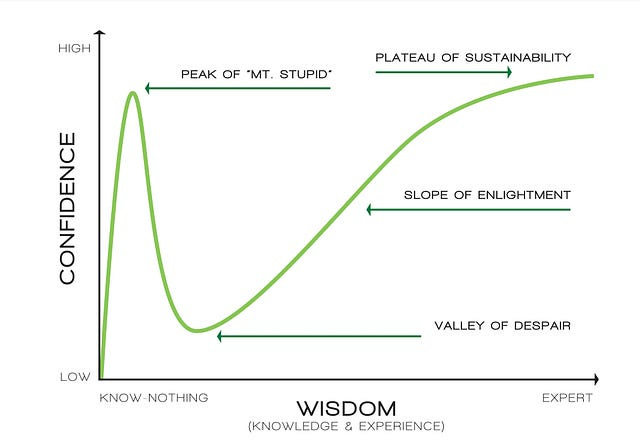How to use clarifying questions to build a great team
Building trust through thoughtful inquiry

The role of a mentor or manager is to help, and at times fine tune, the people they work with. Sometimes I’ll hear people say “The work I do is not fun”. There often is an underlying reason that doesn’t exactly have to do with work. Rather than accept the statement at face value, I like to understand the core reasons behind this sentiment. The only way to get to it is to ask clarifying questions, because oftentimes the person voicing this thought, doesn’t really know what that is either.
The key to getting to the bottom of the issue is to not suggest solutions based on the scenarios laid out by the person, but to ask clarifying questions so that —
You can get a better understanding of the root of the matter
The other person feels like they are being heard as opposed to being told what to do
The other person feels like they are in control of how to bring about change because if this conversation is fruitful, frequently they come to a glimmer of a conclusion on their own.
Some areas that I have found to be interesting to explore on this front are related to
📚 Learning
👑 Ownership
♟️ Strategy
🤝 Tactical Support
🍂 Professional Staleness
🏡 Personal Life
⚖️ Work-Life Balance
🪚 Staying Cutting Edge
🥷Opportunities
Let us look at these in a bit more detail.
📚 Learning
As knowledge workers, we are always on the quest for the next thing in our learning path and need to be constantly challenged. Once you stop learning, that breeds a lot of frustration.
To get someone out of the “Valley of Despair”, ask questions like —
Even if some of the tasks you are doing are mundane, do you feel like you are learning?
If not, what would you like to do more or do less of?
What are you trying to achieve (holistically) in the next 12–18 months?
👑 Ownership
Ownership is very important for each and every person on your team. Being the subject matter expert on things like domains, services, products, is both good for their professional reputation as well as a way to sharpen the saw when it comes to knowing a topic inside out. This can be very motivating for long term growth.
To empower people, ask questions like —
Is it clear to you what you are being asked to do? Both at the granular task level, as well as the general vision of the feature/product.
Do you know what the monthly/quarterly/annual vision for your team is?
Do you have the agency to take ownership of the components you feel strongly about?
♟️ Strategy
Strategy doesn’t need to be this grand thing that is the sole dominion of CEOs and CTOs. Being able to peek your head above your day-to-day work to see what direction you are heading in, is strategy. Being able to do it gives people a feeling of empowerment and clarity over their destiny.
If someone is unable to think strategically, ask questions like —
Are you losing the forest for the trees? Are you spending too much time in the weeds without surfacing for air?
Are there aspects of the business or problem you are solving that are unclear to you?
Do you need to spend more time with your stakeholders/customers/users to be able to understand why you are being asked to do something?
🤝 Tactical Support
Being given autonomy is one thing, but it has to be accompanied with providing air cover. While employees don’t want to be micromanaged, they do want to be unblocked and challenged to be better.
To check if someone is receiving the right level of support, ask questions like —
How do you want to be supported?
Are you getting the “right” (not too much/little) kind of support from your teammates or manager?
When you get stuck do you feel like you can lean on your team for getting you unblocked? Are paths of escalating problems clear to you?
🍂 Professional Staleness
If someone is the owner of a project, their team might not want to break status quo as they are the de-facto person to take those kinds of tasks on. This might cause that person to feel trapped in a situation, especially if its not aligning with their long term goals. However, if this person were to have an honest discussion with their team, it might benefit everyone to distribute some of the responsibilities.
If someone feels like they are stuck in a rut, ask questions like —
What are you struggling with these days?
Have you tried swapping work with your team?
If you want to look for new opportunities, do you have the right forums to ask those questions?
🏡 Personal Life
This one is a bit dicey since you as the manager (or mentor), need to tread carefully here. Based on either personal history or camaraderie, you can decide what is the right way to ask these questions. The reason this is an important area to address is because there are times when the stress at work or the feeling of work being menial stems from there being some mental unrest on the home front — whether its finances, family or health related. This coupled with the blurred boundaries of work and home in a remote working world can exacerbate the situation. The main goal of these questions is to ensure you are empathetic to the needs of your employee and build trust to show that you truly care about their well-being. As mentioned, respect the employee’s privacy and right to share only what they’re comfortable with.
If someone is under duress from personal situations, ask questions like
How are you managing with everything that’s going on?
Do you need to take some time off to deal with any personal issues? Is there anything we can do to support you during this time?
How is your current workload? Do we need to make any temporary adjustments?
⚖️ Work-Life Balance
One can easily get sucked into the vortex of work and not take the time off. In this age of constant connectivity, the inability to successfully compartmentalize work and personal life can cause burnout. Beyond doing that, rest and recuperation has been proven to be demonstrably important for long term health of an individual.
If someone is at the risk of burnout, ask questions like —
What aspects of your job are currently causing you the most stress or frustration?
What changes could we make to help you feel more energized and engaged at work?
Do you feel like you are rested and recharged after weekends or after taking time off?
🪚 Staying Cutting Edge
Technology moves swiftly these days and is only moving faster with each passing day. This might make some people feel like they are getting left behind because the services or applications they are building still use “outdated” technology. By identifying the right opportunities for the employee as well as the company, creating space for innovation and experimentation helps keep things fresh and exciting.
To check if people are remaining up-to-date, ask questions like —
What new industry trends or technologies have you been exploring recently?
What areas of your expertise do you feel need the most improvement right now?
Are there any professional development resources or activities you would like to engage with?
🥷Opportunities
Whether it is a small startup or a big enterprise, there are always opportunities that reside outside of the immediate boundaries that the employee currently occupies. Try to challenge them to try a new problem domain, a new business vertical or potentially a different occupation altogether. You just need to be creative while putting forward these opportunities in front of the employee.
If someone is hinting that they want to work on something different, ask questions like —
What aspects of your current role do you find most engaging, and which do you find least fulfilling?
What projects or initiatives in other departments have caught your interest recently? If so, what are those and why do you think you are interested in that work?
How do you see your role evolving over the next year or two to align with your career goals and our organization’s needs?
This list is intended to be a conversation starter. Your mileage may vary based on the type of person, type of scenario and how far you are willing to go to get this person to a better state. Trying to get to the root cause of someone’s dissatisfaction before it becomes an uncontrollable situation is the hallmark of a great manager.
Stay alert to the needs of your team, be aware of the context for what causes their performance to ebb and flow and you will be on the road to creating a high performance team.
If you liked this article, please ❤️ to give me feedback! If you agree/disagree with anything, please leave comments or questions on the article and we can discuss!
🤓 This Week’s Top 3
If you live in NY state, this dashboard is an interesting resource to see how the electricity grid is doing at any given time, with all the cooling required during this warm summer.
Cool to see what your Github registration ID is! Mine is ~2.5 million 🤪. Tell me what yours is!
Handy dandy JSON → CSV converter






